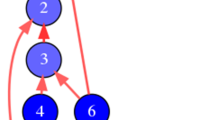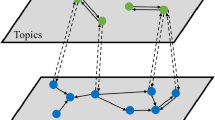Abstract
In a recent work some of the authors have developed an argumentative approach for discovering relevant opinions in Twitter discussions with probabilistic valued relationships. Given a Twitter discussion, the system builds an argument graph where each node denotes a tweet and each edge denotes a criticism relationship between a pair of tweets of the discussion. Relationships between tweets are associated with a probability value, indicating the uncertainty on whether they actually hold. In this work we introduce and investigate a natural extension of the representation model, referred as probabilistic author-centered model. In this model, tweets by a same author are grouped, describing his/her opinion in the discussion, and are represented with a single node in the graph, while edges stand for criticism relationships between author’s opinions. In this new model, interactions between authors can give rise to circular criticism relationships, and the probability of one opinion criticizing another is evaluated from the criticism probabilities among the individual tweets in both opinions.
This work was partially funded by the Spanish MINECO/FEDER Projects TIN2015-71799-C2-1-P and TIN2015-71799-C2-2-P, by the European H2020 Grant Agreement 723596, and by the 2017 SGR 1537 and 172.
Access this chapter
Tax calculation will be finalised at checkout
Purchases are for personal use only
Similar content being viewed by others
Notes
- 1.
The discussion URL is https://twitter.com/jordievole/status/574324656905281538.
- 2.
This is because in our probabilistic model the label \(P(t_1,t_2)\) assigned to an edge \((t_1,t_2)\) is based only on the information inside the tweets \(t_1\) and \(t_2\) and not on other answers from the same authors.
- 3.
We plan to implement the other weighting schemes in the near future.
References
Alsinet, T., Argelich, J., Béjar, R., Fernández, C., Mateu, C., Planes, J.: Weighted argumentation for analysis of discussions in Twitter. Int. J. Approx. Reason. 85, 21–35 (2017). https://doi.org/10.1016/j.ijar.2017.02.004
Alsinet, T., Argelich, J., Béjar, R., Fernández, C., Mateu, C., Planes, J.: An argumentative approach for discovering relevant opinions in Twitter with probabilistic valued relationships. Pattern Recognit. Lett. 105, 191–199 (2018). https://doi.org/10.1016/j.patrec.2017.07.004
Bench-Capon, T.J.M.: Value-based argumentation frameworks. In: Proceedings of 9th International Workshop on Non-Monotonic Reasoning, NMR 2002, pp. 443–454 (2002)
Bench-Capon, T.J.M., Dunne, P.E.: Argumentation in artificial intelligence. Artif. Intell. 171(10–15), 619–641 (2007). https://doi.org/10.1016/j.artint.2007.05.001
Besnard, P., Hunter, A.: A logic-based theory of deductive arguments. Artif. Intell. 128(1–2), 203–235 (2001). https://doi.org/10.1016/S0004-3702(01)00071-6
Bosc, T., Cabrio, E., Villata, S.: Tweeties squabbling: positive and negative results in applying argument mining on social media. In: Computational Models of Argument - Proceedings of COMMA 2016, pp. 21–32 (2016). https://doi.org/10.3233/978-1-61499-686-6-21
Chang, C., Lin, C.: LIBSVM: A library for support vector machines. ACM TIST 2(3), 27:1–27:27 (2011)
Dung, P.M.: On the acceptability of arguments and its fundamental role in nonmonotonic reasoning, logic programming and n-person games. Artif. Intell. 77(2), 321–357 (1995). https://doi.org/10.1016/0004-3702(94)00041-X
Dung, P.M., Mancarella, P., Toni, F.: Computing ideal sceptical argumentation. Artif. Intell. 171(10–15), 642–674 (2007). https://doi.org/10.1016/j.artint.2007.05.003
Dusmanu, M., Cabrio, E., Villata, S.: Argument mining on twitter: arguments, facts and sources. In: Proceedings of the 2017 Conference on Empirical Methods in Natural Language Processing, EMNLP 2017, pp. 2317–2322 (2017)
Egly, U., Gaggl, S.A., Woltran, S.: ASPARTIX: Implementing argumentation frameworks using answer-set programming. In: Garcia de la Banda, M., Pontelli, E. (eds.) ICLP 2008. LNCS, vol. 5366, pp. 734–738. Springer, Heidelberg (2008). https://doi.org/10.1007/978-3-540-89982-2_67
Faber, W., Woltran, S.: Manifold answer-set programs for meta-reasoning. In: Erdem, E., Lin, F., Schaub, T. (eds.) LPNMR 2009. LNCS (LNAI), vol. 5753, pp. 115–128. Springer, Heidelberg (2009). https://doi.org/10.1007/978-3-642-04238-6_12
Grosse, K., González, M.P., Chesñevar, C.I., Maguitman, A.G.: Integrating argumentation and sentiment analysis for mining opinions from Twitter. AI Commun. 28(3), 387–401 (2015). https://doi.org/10.1016/j.artint.2007.05.003
Lin, H.T., Lin, C.J., Weng, R.C.: A note on Platt’s probabilistic outputs for support vector machines. Mach. Learn. 68(3), 267–276 (2007). https://doi.org/10.1007/s10994-007-5018-6
Platt, J.C.: Probabilistic outputs for support vector machines and comparisons to regularized likelihood methods. In: Advances in Large Margin Classifiers, pp. 61–74. MIT Press, Cambridge (1999)
Simari, G.R., Rahwan, I.: Argumentation in Artificial Intelligence. Springer, New York (2009). https://doi.org/10.1007/978-0-387-98197-0
Author information
Authors and Affiliations
Corresponding author
Editor information
Editors and Affiliations
Rights and permissions
Copyright information
© 2018 Springer International Publishing AG, part of Springer Nature
About this paper
Cite this paper
Alsinet, T., Argelich, J., Béjar, R., Esteva, F., Godo, L. (2018). A Probabilistic Author-Centered Model for Twitter Discussions. In: Medina, J., et al. Information Processing and Management of Uncertainty in Knowledge-Based Systems. Theory and Foundations. IPMU 2018. Communications in Computer and Information Science, vol 854. Springer, Cham. https://doi.org/10.1007/978-3-319-91476-3_56
Download citation
DOI: https://doi.org/10.1007/978-3-319-91476-3_56
Published:
Publisher Name: Springer, Cham
Print ISBN: 978-3-319-91475-6
Online ISBN: 978-3-319-91476-3
eBook Packages: Computer ScienceComputer Science (R0)




